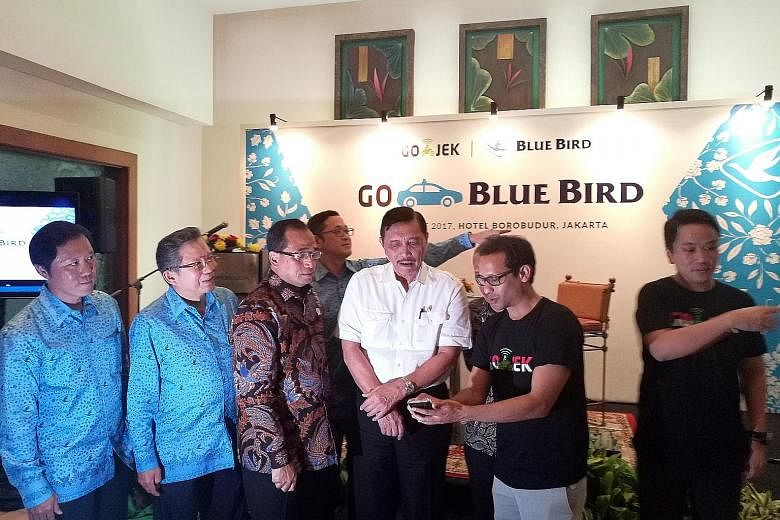New rules in Indonesia, aimed at providing a level playing field for traditional transport service providers and ride-hailing apps such as Grab, Uber and Go-Jek, kick in tomorrow.
But the firms will be given time to comply with the new regulations, which include a cap on the fleet size of those running ride-hailing apps, and a requirement for all riders and drivers to hold public transport licences, said Transport Minister Budi Karya yesterday.
The announcement comes a day after Parliament said it would revise laws to legalise motorcycle taxis known locally as ojeks - a popular but technically illegal mode of transport in a country infamous for its gridlocks.
These come amid rising pressure from cabbies and drivers of private buses, mini-vans and the three-wheeled bajajs in Jakarta and other cities in Indonesia, who have called for a ban on ojeks, particularly those run by Grab and Go-Jek.
Those traditional transport providers claim to have suffered a significant loss of fares since the emergence of ride-hailing apps, which have flourished since they first appeared in 2014.
Many have also accused the newcomers of undercutting prices and offering much lower fares, as well as benefiting from the lack of regulation because the drivers of ojeks and private cars need not obtain vocational licences or send their vehicles for regular road-worthiness tests.
The unhappiness of those traditional cabbies has also escalated into street protests that sometimes result in violent clashes between the transport workers in Jakarta and Bogor.
President Joko Widodo, however, has insisted that ride-hailing apps be allowed in Indonesia because they address a critical need.
Coordinating Maritime Affairs Minister Luhut Pandjaitan, who also oversees the Transport Ministry, yesterday said Indonesia must adapt to changes and adjust regulations to coincide with advances in technology.
Aside from caps on fares and fleet size, as well as licensing, firms such as Go-Jek will have to send vehicles used by their riders and drivers for inspection to ensure they are safe and road-worthy.
"The upcoming regulation is an effort by the government to strike an equilibrium, and we want to be relatively fair, but there is no single regulation that will appease every single person," Mr Luhut added.
Economist Didik Rachbini, who was a commissioner at Indonesia's anti-trust agency, said the rise of ride-hailing apps is inevitable, but agrees that regulations to safeguard the industry are needed.
This is because the ride-hailing app firms' business model is to grow the pool of drivers to boost profits and charge passengers low fares to attract them, said Professor Didik.
"They do not achieve profits from those operations, but from the capital market when they go public or sell shares to investors," he added. "So they need to change this business model, otherwise the disruption they create in the industry will be painful as is seen now."
Go-Jek, however, has made an effort to work with traditional service providers such as Blue Bird, the country's largest taxi company.
The rare collaboration between a new-age start-up and a traditional transport firm, announced yesterday, will allow Go-Jek users to hail a car under its Go-Car services or one of Blue Bird's 35,000 taxis.
This also means that Blue Bird cabbies will be able to tap users of the Go-Jek app, which to date has recorded 40 million downloads, said Blue Bird director Adrianto Djokosoetono.
"For Blue Bird, this means an additional channel, so (Go-Jek) gets additional fleet while (Blue Bird) gets additional access," he said.
Go-Jek chief executive Nadiem Makarim said yesterday that it was a win-win arrangement.
"We have had hard times keeping up with demand, which was always higher than the supply," he added.
"So we are happy to let Blue Bird come into our ecosystem."

